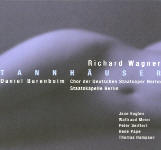For the most part, this is the Dresden version of Tannhäuser, although the sirens’ song after the overture borrows from the Paris edition. (For the complete Paris edition, Sinopoli/Domingo on DG or Solti/Kollo on Decca is recommended). The Staatskapelle Chorus and Staatsoper Orchestra are the real stars here, playing and singing with clarity, shine, and a depth of feeling and understanding that is gloriously underscored by Teldec’s exquisite recording. Almost equally wonderful is the leadership of Daniel Barenboim, who makes absolute sense of this oft-revised, somewhat stylistically hodge-podged score and drama. Indeed the second act here holds together better than I’ve ever heard it before, with a clear build-up of tension in the song contest that reaches an explosion with Tannhäuser’s obsessed outburst and Elisabeth’s defense of him.
Not all the solo singing is as compelling. Best is Rene Pape’s resonant, authoritative Landgraf, making the most of this sometimes windy character; indeed, his is the most beautiful voice I’ve ever heard touch this music. Of Peter Seiffert, you might find only good things to say: His attention to the text makes his every utterance interesting, the voice is attractive, and he seems tireless. Further, his tone is bright and ringing–and believe it or not, this presents a problem. There’s rarely a sense of gloom or doom (not to mention Weltschmerz) here as there should be with Tannhäuser; despite some good ranting during the lengthy “Rome Narrative” we never feel that he’s in any sort of psychic pain. Perhaps I’m asking too much, especially since just getting the notes out of this role is enough of a challenge, but that’s how it comes across. He’s not Tannhäuser-lite (I don’t require a Melchior-type of darkness), but even Windgassen, with a similarly non-heroic sound, implied more angst. Oh well.
Jane Eaglen’s Elisabeth is well sung and put forth, and the voice can sound very beautiful, but she’s not nearly as moving as, say, Dernesch (for Solti, in her finest recorded role) or Silja (with Sawallisch). Thomas Hampson’s Wolfram is so gorgeously, sensitively sung (in such impeccable Hoch-Deutsch) that to note that he’s very light for the role seems petty. Gunnar Gudbjornsson’s Walther implies a budding Tannhäuser. Which leaves us with Waltraud Meier’s ship-sinking Venus: Her inappropriate timbre and the ugly upper-third of her voice are criminal beside such proponents of the role as Bumbry and Ludwig, and her attempts at sounding seductive are embarrassing in the face of such vocal pastiness. She cheapens every recording she’s made (save for her first Kundry, which is still miles behind the great Kundrys). And so–on some levels this is a very successful Tannhäuser, but I’d stick with Solti on Decca.
































